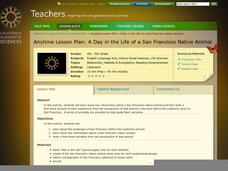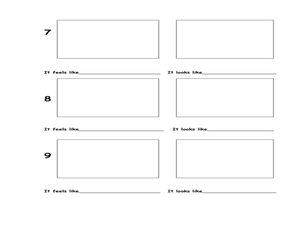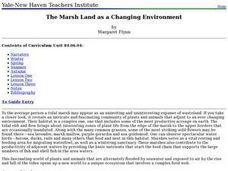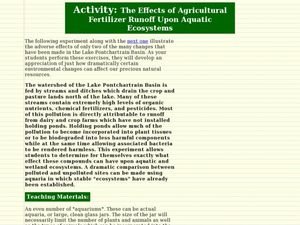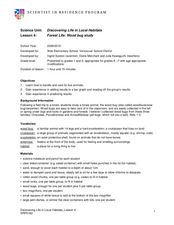NOAA
A Laboratory Simulation of Ocean Surface Currents
Stimulate interest in ocean currents with a simulation. The first installment of a five-part middle school series teaches future oceanographers about the forces that interact to cause ocean currents. A simulation shows how wind and...
Biology Junction
Mammals
Mammals include more than 4,000 species and represent the most dominant land animals on Earth. Scholars learn about the large variety of mammals, including orders unfamiliar to most. The presentation highlights the characteristics and...
California Academy of Science
A Day inthe Life of a San Francisco Native Animal
Although the lesson is specifically about the San Francisco Bay area, it's good enough to be adapted to any local region. Children research what the landscape in San Francisco was like prior to settlement, they consider the types of...
Biology Junction
Protists and Fungi
It's alive, but what is it? Protists share similarities with plants, animals, and fungi without being classified as any of those three. Learn more about protists and the kingdom fungi with a short presentation. It describes the parts of...
Curated OER
Exploring Marine Objects
Students identify the sources of water on Earth. In this life science lesson, students list the different plants and animals that live in the ocean. They explore marine objects in the lab and draw them.
Curated OER
Our Country's Environment
In this environment worksheet, students complete a crossword puzzle using the word bank and definitions for terms about the land and its water.
Curated OER
Wetland in a Pan
Students examine wetlands and what the effects of destroying them will do. In this wetland lesson students relate the importance of wetland functions to their own needs.
Curated OER
Animal Habitats Cut and Paste
In this animal homes worksheet, students cut out 6 pictures of animals and paste them under the appropriate habitat: water or land.
Curated OER
Animal Movements
Students discuss the behavior of different animals and how they move. They explore the ways that this helps them live and find food in their environment. They participate in a game that requires them to mimic the ways in which animals move.
Curated OER
The Marsh Land as a Changing Environment
Sixth graders continue their examination of the state of Connecticut. After taking a field trip, they identify the types of birds, plants, invertebrates and vertebrates who make their home in the salt marshes. In groups, they identify...
Curated OER
Dry-Land Kalo-Growing New Plants from Stems
Students explore Hawaiian plants. In this Hawaii culture and botany lesson, students plant the haha(stem) of a taro plant. Students listen to Hawaiian myths about the taro plant and chorally speak a Hawaiian chant of protection. Students...
Curated OER
Basic Needs of Living Things - Lesson Two
Fourth graders study and identify the basic needs of a variety of organisms. Terrariums and aquariums are used to demonstrate what plants, animals, and fish need to stay alive. These two classic models are used to effectively convey what...
Curated OER
Oddball Out: Animals
In this problem solving worksheet, students analyze a row of pictures
of various animals to determine which creature is different from
the others pictured.
Curated OER
Sunken Millions
This PowerPoint features a game based on the animal life. The interactive slides include 20 questions about animal needs, animal groups, and animal traits. The questions include multiple choice answers and 4 different levels of...
Curated OER
Managing Nutrients in Livestock Manure
Livestock managers reinforce math and science skills while learning about the nutrients found in manure. They predict which animal produces the largest amount and which animal's manure contains the most nitrogen. Finally, they compare...
Curated OER
The Effects of Agricultural Fertilizer Runoff Upon Aquatic Ecosystems
Students measure the toxic levels of runoff and discuss the effects it would have on the aquatic system. In this runoff lesson plan, students answer questions to how runoff would affect the animals in an aquatic system.
Curated OER
User-friendly rivers
Students explore and explain their connection to rivers through watersheds. They break into three groups. Each group needs: Blue enamel paint, Miniature objects to simulate a model river system, modeling clay, Tempera paint, Toothpicks...
Curated OER
Eye On Conservation Drainage Basin
Pupils are able to describe the importance of wetland vegetation. They describe the impacts human activities have on water systems. Students compare and contrast the effect of different soil types on water filtration.
Curated OER
Weathering Landforms
Fifth graders brainstorm a list of ways the Earth's surface can change. As a class, they are introduced to the concepts of erosion and weathering and discover how wind and water cause changes to the surface of the Earth. To end the...
Curated OER
Regulating the Internal Environment
This presentation begins with the many problems multicellular organisms which rely on diffusion encounter. There are many diagrams of mammalian organ structures, and they are labelled with their relevant functions. This an excellent...
Curated OER
Forest Life- Wood Bug Study
Examine wood bugs and their habitat. Learners gather wood bugs and examine their bodies. Then discuss their body parts and how they help them survive. They also predict where they think wood bugs live to then graph the class results.
Curated OER
X-Ray Eyes
Students observe Australian X-ray paintings for information and to understand the art techniques used. Then they imagine and draw the inner organs of an animal. Students also research the anatomy of the animal to analyze the accuracy of...
Biology Junction
Seed Plants: Gymnosperms and Angiosperms
One of the reasons plants found success on land relates to seed development. Scholars learn about many different forms of seeds and how they changed over time. It describes the structure and function of many different types of seeds in...
Curated OER
Stella the Swan
Students study the similarities and differences between ducks, geese, and swans. They tell the story about how water fowl adapt to life in water using props.




